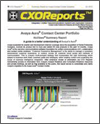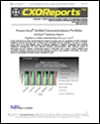September 11, 2008
Phoenix Center Analysis: Wireless 'Carterfone' Regulation Would Raise Mobile Handset Prices
 By Shireen Dee, TMCnet Contributor
By Shireen Dee, TMCnet Contributor
Phoenix Center recently released a report indicating that regulation of bundling handset sales with mobile services would not benefit consumers, and in fact would be harmful.
"Handset subsidies have helped put cell phones into the hands of millions of Americans, especially low-income households," said Thomas Koutsky, Phoenix Center Resident Scholar and co-author of the study. "Given the high stakes, we urge careful study and analysis of the costs and benefits of proposed regulation that would limit or even eliminate those practices."
Typically, mobile network providers like AT&T (News - Alert) Wireless, Verizon Wireless, and T-Mobile have offers for customers featuring significant discounts on new handsets in exchange for one or two-year service contracts. The Phoenix Center analysis found that if the Federal Communications Commission (FCC (News - Alert)) combined such bundling practices with the wireless “Carterfone” rules, it would result in consumers paying higher prices for mobile handsets.
"It is ironic that proponents of wireless Carterfone (News - Alert) tout their rules as being 'pro-consumer,' because our analysis shows that such rules would likely drive up the cost of equipment with little, if any, reduction in wireless service prices," said Lawrence Spiwak, president of the Phoenix Center and co-author of the study. "The pricing implications of wireless Carterfone are about as anti-consumer as you can get."
The Carterfone regulation was implemented in the 1960’s for prevention of a regulated, vertically integrated Bell System monopoly where customers were required to use only those phones which were provided by the Bell System. Though in the 1980’s and 1990’s these rules were lifted for the landline telephone network, with emerging competition a similar regulation had been suggested to be applied in the U.S. wireless industry by many advocates even though the wireless network environment was already quite competitive.
“There is no free lunch,” said George Ford, Chief Economist of the Phoenix Center and co-author of the study. “The typical consumer wants a free or very low cost cell phone, and mandatory wireless Carterfone rules would eliminate the incentive to offer such discounts. That will have consequences — all consumers will pay higher prices, while only the few more sophisticated users would likely receive any benefit from such regulations.”
Don’t forget to check out TMCnet’s White Paper Library, which provides a selection of in-depth information on relevant topics affecting the IP Communications industry. The library offers white papers, case studies and other documents which are free to registered users.
Shireen Dee is a contributing editor for TMCnet. To read more of Shireen's articles, please visit her columnist page.
Edited by Mae Kowalke














